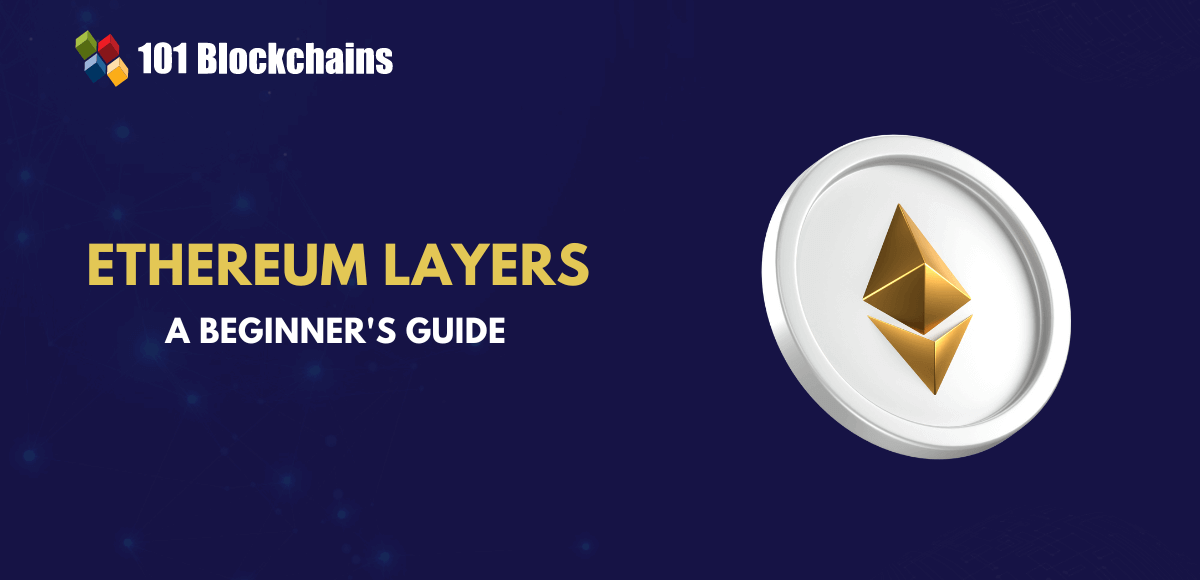Learn how blockchain truly works, master key definitions, and uncover what makes smart contracts so "smart." Dive into the fundamentals, gain valuable insights, and start your blockchain journey today!

- Ethereum
Georgia Weston
- on March 19, 2022
Know Everything About Ethereum Name Service (ENS)
Have you recently come across the term ENS? Let’s dive in to get more insights on Ethereum Name Service (ENS), including its architecture and other details.
After having used the internet for years, you would barely wonder about how people accessed websites in the early days of the internet. Let’s just say it was not as easy as typing in a website name in your browser’s address bar. On the contrary, people had to type the IP address, generally a string of numbers and quite difficult to remember. Imagine having to type in long strings of numbers every time you wanted to browse your Instagram feed.
Quite a tedious task, isn’t it? Ethereum Name Service has emerged as a prominent solution to solve the same problem in the crypto space. If you take a look at crypto, people have to remember long and complicated addresses for accessing their crypto assets. The highly technical nature of the crypto space can be quite overwhelming for many users, especially beginners and non-tech savvy people.
ENS aims to make crypto as easy as browsing the internet for everyone. How? The following post helps you find answers to “What is Ethereum Name Service (ENS)?” alongside reflecting on how it brings value to the crypto space.
Excited to build your skill in Ethereum development by leveraging the ethers.js library? Enroll Now in Ethers.Js Blockchain Developer Course!
Background for Ethereum Name Service
Before reflecting on the definition of Ethereum Name Service (ENS), it is important to identify its background. Why did ENS come into the crypto space? If you look closely at the world of blockchain and crypto, you will find that it is still in the initial formative stages. Much like the IP address stage in the early days of the internet, crypto transactions come with hexadecimal strings of numbers. Therefore, users encounter issues in accessibility and ease of use with different blockchain-based solutions.
You can take a look at the examples of crypto transactions to understand the problems of accessibility and ease of use. If you want to send a payment in crypto, then you would need a public wallet address. The public wallet address is basically a string of letters and digits arranged in a random, gibberish manner. Furthermore, different crypto users have unique public addresses for different cryptocurrencies. You can clearly notice how complicated crypto can be with the long strings of letters and numbers. Enter ENS!
Build your identity as a certified blockchain expert with 101 Blockchains’ Blockchain Certifications designed to provide enhanced career prospects.
Ethereum Name Service
ENS emerged as a productive solution for simplifying the crypto and DeFi sector, especially for beginners. It allows users to create universal nicknames for all their public addresses and decentralized accounts. Rather than using an incomprehensible string of keys for different crypto addresses, users can rely on one ENS Ethereum domain. ENS focuses on serving as the naming protocol for decentralized internet services by enabling portable and interoperable web 3.0 usernames across different decentralized apps and blockchains.
The simple answer for “What is Ethereum Name Service” paints it as a simple lookup service developed on the Ethereum blockchain. ENS helps in linking information to a name and not only works for Ethereum but also for other blockchain networks. You can think of ENS as the nickname generator in the case of public Ethereum addresses, improving accessibility of crypto.
However, it helps in translating machine-readable addresses on other blockchain networks to human-readable addresses. Basically, ENS works by mapping the long public addresses and replacing them with simple and easily readable names. You can get a better understanding of how Ethereum Name Service works by reflecting on its architecture.
Want to learn about The Ethereum Technology? Enroll now: The Complete Ethereum Technology Course
ENS Architecture
The ENS is basically a distributed, open technology developed on Ethereum blockchain, working as an extensible naming system. The operations of ENS depend on its architecture, which includes two important components serving distinct functions. You have the registry and resolvers as two important highlights in the architecture of ENS. Let us learn more about the ENS architecture to find the benefits of Ethereum Name Service and how it works.
-
ENS Registry
The first highlight in the ENS architecture is the registry, which is basically a single, smart contract. ENS registry helps in maintaining a list of all domains and sub-domains followed by storing three critical points of information. The registry stores data about the owner of the domain and the resolver of the domain. In addition, the registry also stores data about the caching time-to-live for all records in the domain. In the case of Ethereum Name Service, the domain owner can be a smart contract or a user through external accounts.
The ENS registry also features a registrar, serving as a smart contract with ownership of a domain. The registrar issues the subdomains of the specific domain in their control to users who comply with specific contract rules. Some of the privileges of the domain owners in ENS Ethereum registry include,
- Transferring ownership of subdomains
- Allocation of TTL and resolver for the domain
- Transferring domain ownership to another address
The primary function of the ENS registry focuses on mapping from a name to the resolver.
-
Resolvers
The resolvers are an important highlight in ENS architecture, taking major responsibility for the work of ENS. As a matter of fact, resolvers offer the answer to “Is Ethereum Name Service safe?” with clarity. Resolvers are basically smart contracts that can facilitate implementation of specific standards. Some of the general resolver implementations address straightforward requirements, such as providing infrequently changed addresses for specific names.
The resolver must work on implementation of methods for providing different records such as cryptocurrency addresses and IPFS content hashes. Resolvers use the EIP standardization process for defining new record types anytime. Interestingly, the EIP standardization process takes away the requirement for any modifications in the ENS registry or existing resolvers.
Get familiar with the terms related to Ethereum with Ethereum Flashcards
How Can I Use ENS?
The benefits of Ethereum Name Service in facilitating ease of use and accessibility of crypto solutions are commendable. However, the basic understanding of the architecture of ENS can be quite complicated for beginners. Think of ENS as a combination of two Ethereum-based smart contracts, the ENS registry, and the resolver. The ENS registry works on documentation of all registered domains on ENS and stores three critical pieces of information about the domain. On the other hand, the resolver works on translating the machine-readable addresses to domain names.
You would obviously want to find out the possible methods for using ENS. If you want to create a web3 username, then you can just access the ENS app and look for available domain names. Upon finding the domain name of your choice, you have to complete the registration process of Ethereum Name Service in a few simple steps. The registration process involves confirmation of two transactions from a wallet for payment of yearly fees. After getting ownership of the domain, you can just link it to crypto wallets and websites alongside creating multiple subdomains.
Excited to learn about the ethereum developement? Enroll Now in Ethereum Development Fundamentals Course
Who Governs ENS?
Well, the governance of ENS also stands out as a prominent concern in a discussion on what is Ethereum Name Service is and how it works. The most notable highlight of ENS is that it is an open-source and decentralized project developed on the Ethereum blockchain. Therefore, ENS does not rely on a traditional company hierarchy for management. The ENS project airdropped ENS tokens to different users alongside creating a DAO or decentralized autonomous organization for its governance.
ENS token serves as an integral aspect of governance in the ENS DAO by working as the utility and governance token. The ENS token helps in submitting proposals alongside casting votes for influencing future development of the protocol. Any ENS token holder could cast their votes in the various governance proposals in ENS DAO.
Excited to develop fluent knowledge of the DAO ecosystem? Enroll Now in DAO Fundamentals Course!
What is So Special about Ethereum Name Service?
The detailed overview of architecture, functioning, and governance of ENS offers a strong impression of the tool’s capabilities. However, it is reasonable to wonder about the special propositions in ENS Ethereum which would draw people towards it. You can think of it as a naming service for crypto, just like DNS is for the internet. The only difference is that ENS presents a decentralized alternative to the conventional DNS used for the internet.
As a result, the benefits of Ethereum Name Service help in addressing the risks pertaining to a single point of failure. On top of it, the power of blockchain also provides a strong boost to the security and censorship-resistance traits. The use of two smart contracts in the fundamental design of ENS also provides the assurance for interoperability with Ethereum-based smart contracts, applications, and other smart contracts.
Apart from offering human-readable nicknames for complicated crypto addresses, ENS also provides adequate safeguards. Many people asking “Is Ethereum Name Service safe?” should know that ENS works by using fixed-length 256-bit cryptographic hashes. ENS uses the Namehash process for deriving the hash from a particular name while safeguarding the hierarchical properties. The recursive process could help in generating unique hashes for valid domain names. As a result, the cryptographic hashes ensure improved security for ENS.
The most significant highlight among the benefits of Ethereum Name Service points towards its availability as an open public utility. With the help of community governance and decentralized components, ENS has the capability to develop formidable support for the crypto and DeFi ecosystem.
Want to know more about DeFi? Enroll Now: Introduction to DeFi – Decentralized Finance Course
Final Words
The detailed overview of Ethereum Name Service fundamentals shows how it is a revolutionary tool for the crypto landscape. When beginners try to enter the crypto space, they encounter long and complicated strings of crypto addresses. Since crypto and DeFi advocate for accessibility, it is important to find solutions that can resolve issues with usability in crypto.
ENS solves one of the most crucial challenges in the crypto space by facilitating conversion of machine-readable addresses into human-readable domains. In addition, it also offers a promising instrument for streamlining the management of crypto assets by bringing all addresses under one domain. Learn more about ENS in detail right now to explore how it can transform crypto space.
*Disclaimer: The article should not be taken as, and is not intended to provide any investment advice. Claims made in this article do not constitute investment advice and should not be taken as such. 101 Blockchains shall not be responsible for any loss sustained by any person who relies on this article. Do your own research!





